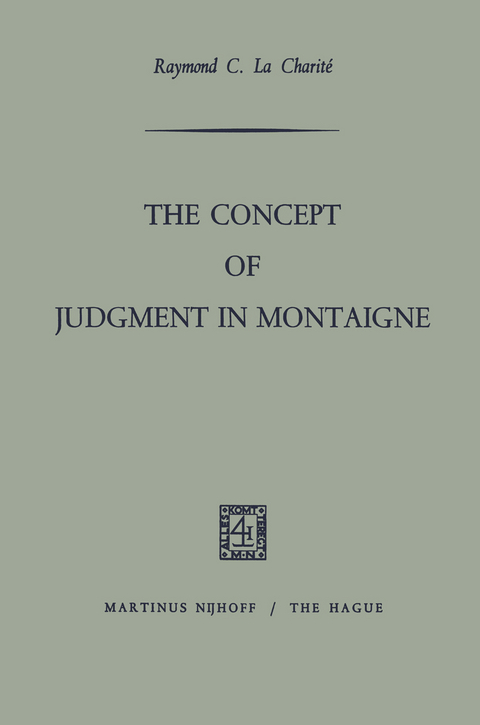
The Concept of Judgment in Montaigne
Seiten
1968
Springer (Verlag)
978-94-015-0357-0 (ISBN)
Springer (Verlag)
978-94-015-0357-0 (ISBN)
Many critics seem to consider it inappropriate or unnecessary to ask what Montaigne means by the faculty of judgment. Laumonier speaks of "Ie bon sens, qu'il oppose si souvent a la memoire et qu'il appelle encore 'jugement' et 'entendement', c'est-a-dire la faculte de penser et de reflechir juste. " 1 Our appreciation of what is implied by judgment, that is by Montaigne's notion of judgment, has been delayed perhaps by a too facile acceptance of a so-called synonymity of meaning among the psychological terms used by Montaigne. In a discussion of key concepts in Montaigne, Donald M. Frame has accurately summarized the present situation with regard to our knowledge of Montaigne's notion of judgment and other key concepts: "We all have our hunches, but we need more than that. " 2 For the expression of his interest and concern for the intellectual and moral activities and capabilities of the mind, Montaigne draws upon a broad and elementary semantic field. These primary psychological terms are jugement, entendement, sens, raison, discours, and conscience.
Al- though these words may be used synonymously, Montaigne does seem to maintain certain basic distinctions among them; frequent substi- tutions of terms must be the result of semantic and ideational differ- ences. Moreover, the association of several psychological words within a single sentence implies gradations, however slight they may be.
Al- though these words may be used synonymously, Montaigne does seem to maintain certain basic distinctions among them; frequent substi- tutions of terms must be the result of semantic and ideational differ- ences. Moreover, the association of several psychological words within a single sentence implies gradations, however slight they may be.
I. Ignorance, Formation, and Operation.- Ignorance and Judgment.- Formation of Judgment.- Operation of Judgment.- II. The Limitations of Judgment.- Exaltation and Alteration.- God and Institutions.- The Emotional Nature of Man.- Deficiency: A Practical Guide.- III. Judgment and Being.- Self-Identification.- The Role of Appraisal.- The Problem of Essence and Self-Awareness.- The Nature of Movement and Personality.- The Function of Experience.- The Relationship of Judgment and Life.- IV. The Relationship of Judgment to the Other Faculties.- Entendement.- Sens.- Raison and Discours.- Conscience.- Conclusion.
| Zusatzinfo | 149 p. |
|---|---|
| Verlagsort | Dordrecht |
| Sprache | englisch |
| Maße | 155 x 235 mm |
| Themenwelt | Geisteswissenschaften ► Geschichte |
| Recht / Steuern ► Allgemeines / Lexika | |
| Recht / Steuern ► EU / Internationales Recht | |
| Recht / Steuern ► Privatrecht / Bürgerliches Recht | |
| Recht / Steuern ► Wirtschaftsrecht ► Bank- und Kapitalmarktrecht | |
| ISBN-10 | 94-015-0357-5 / 9401503575 |
| ISBN-13 | 978-94-015-0357-0 / 9789401503570 |
| Zustand | Neuware |
| Haben Sie eine Frage zum Produkt? |
Mehr entdecken
aus dem Bereich
aus dem Bereich
CRR, IFR, SSM-VO, SRM-VO, EBA-VO
Buch | Softcover (2024)
dtv Verlagsgesellschaft
21,90 €
Währung, Bankenaufsicht, Zahlungsverkehr/Kredit
Buch | Softcover (2024)
dtv Verlagsgesellschaft
21,90 €


